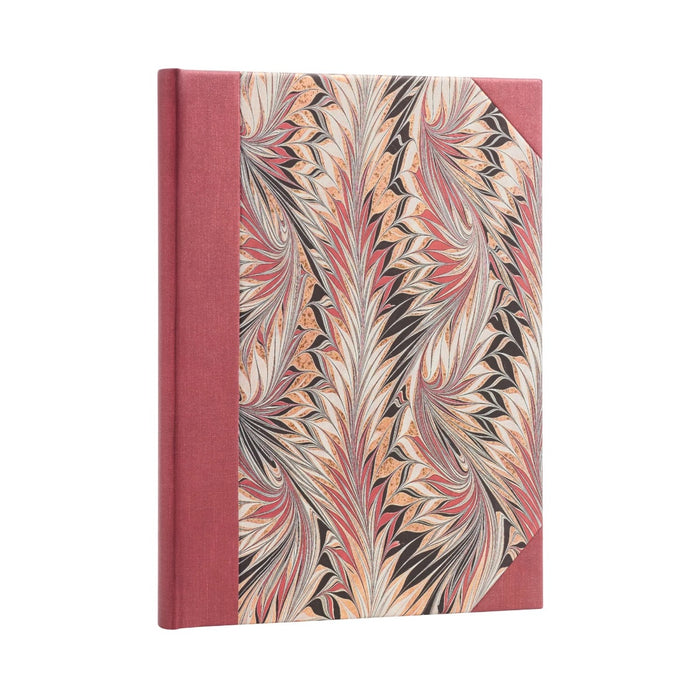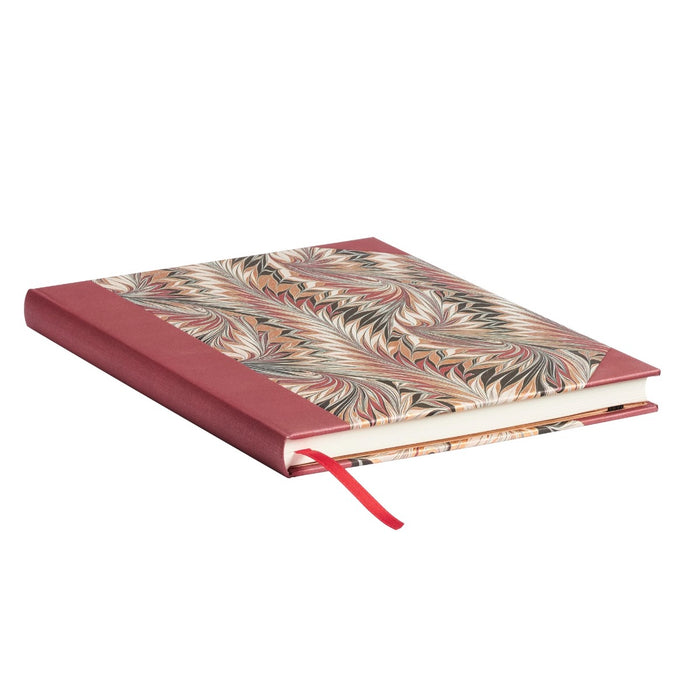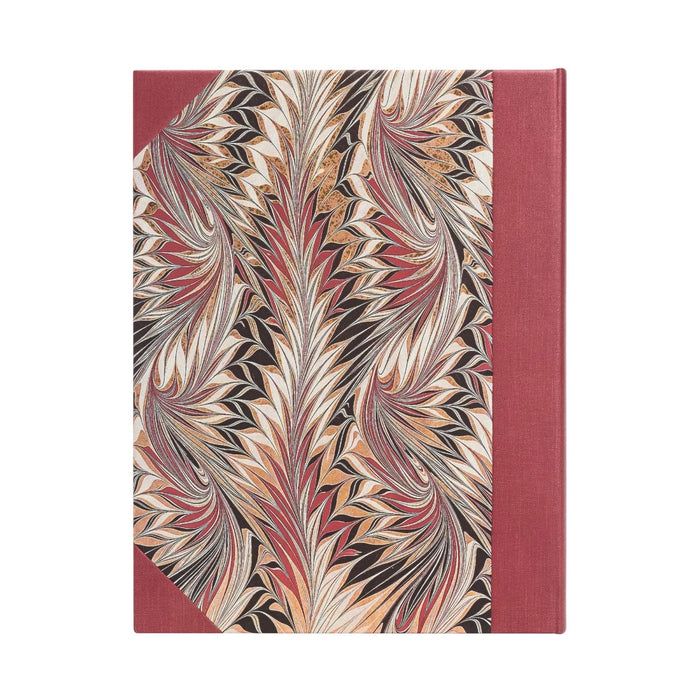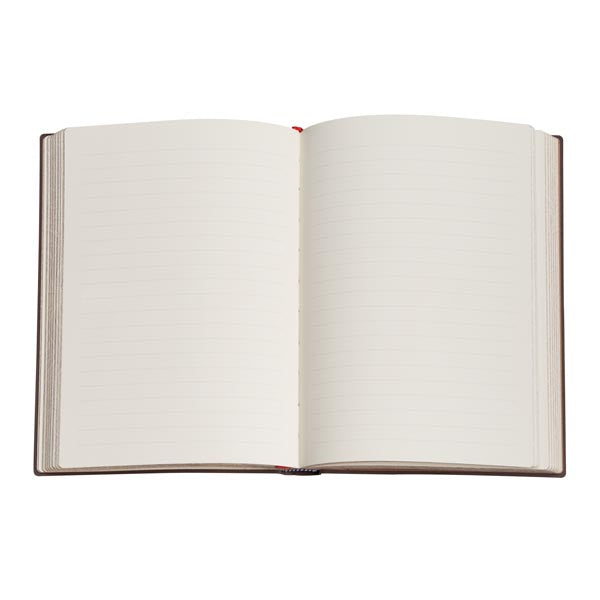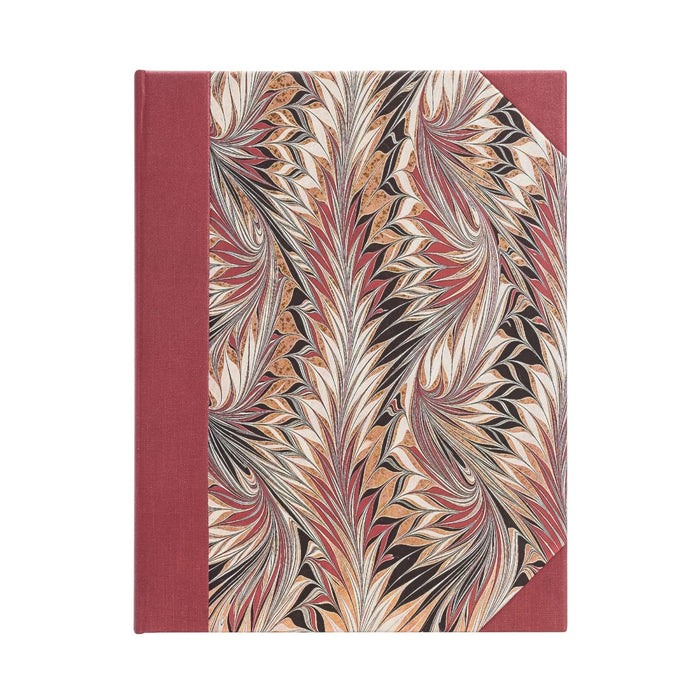
Paperblanks Cockerell Marbled Paper - Rubedo, Ultra - Lined
RUBEDO
Cockerell Marbled Paper
The Cockerell and Son Bindery is celebrated for their unique style of paper marbling, developed by Sandy Cockerell. He took the tradition of handmade marbled papers and found a way to produce the strikingly complex designs at high speeds and volumes. We have reproduced one of these iconic marbled papers here.
| FORMAT |
Ultra
|
|
|---|---|---|
| SIZE |
Width: 180mm (7")
Height: 230mm (9") Depth: 20mm (¾") |
|
| INTERIOR | Lined | |
| SPACE BETWEEN LINES | 8.11mm | |
| LINES PER PAGE | 25 | |
| PAGE COUNT | 144 Pages | |
| CLOSURE | Elastic Band | |
| COLOUR | Red | |
| GSM (PAPER WEIGHT) | 120 | |
| COVER | Hardcover | |
| EDGE PRINTING |
No
|
|
| BINDING TYPE |
Smyth Sewn
|
|
| POUCH TYPE |
Memento Pouch
|
|
| INTERIOR PAPER |
Custom-Designed Laid Paper
|
|
| RIBBON MARKERS |
1
|
|
| MORE FEATURES |
|
|
- Original Art: Marbled paper designed by Cockerell and Son Bindery
- Era: 20th century
-
Region: Grantchester, England
For nearly a century, the Cockerell family name represented a tradition of high-quality bookbinding and unique marbled paper design. When we first launched the Paperblanks brand back in 1992, it was their iconic decorative papers that we turned to as one of our foundational journal covers. Now, over 30 years after that first release, we are honoured to bring a Cockerell design back to our collection.
This technique was developed by the late Sydney (Sandy) Morris Cockerell, who found inspiration in a paper dyeing tradition that can be traced to Turkey and the Far East. Sandy was the son of Douglas Bennett Cockerell, who began the London-based business after being introduced to the book arts by William Morris of Kelmscott Press. Douglas quickly rose to the top of the profession, writing Bookbinding and the Care of Books in 1901, a manual still in print and referenced today. Significantly, one student of the book was Sybil Pye, the great Art Deco bookbinder behind our Sybil Pye Bindings series.
Today, Cockerell and Son is best remembered for Sandy Cockerells marbled papers. Described by many as a latter-day Leonardo, Sandy Cockerell took this painstaking handicraft tradition and found a way to produce the decorative papers at high speeds and volumes. In this way he moved away from the Arts and Crafts mentality that his father and William Morris possessed and embraced the challenges and opportunities that mass production and technology can bring. He improved the design of existing equipment and created his own gadgets and tools when that which he needed did not exist. For his efforts, Sandy Cockerell was awarded an OBE and received an honourary doctorate from Cambridge, and there was even a 1970s documentary film about his work titled The Art of the Marbler.
Beyond the aesthetic beauty, what makes Cockerell marbled paper so special is that each and every piece is a unique original. Like katagami stencils, one must essentially destroy the pattern template to complete each print, so when the same pattern is carried out multiple times, it will slightly alter and evolve with each printing.
When looking to relaunch our Cockerell Marbled Paper series, we were especially drawn to this striking red, black and white pattern. We named it Rubedo, for a Latin word meaning redness which was adopted by alchemists to define the fourth and final major stage of a magnum opus. Rubedo therefore was seen as signalling the successful end of a great work, which we found fitting for writers and artists alike. We hope this wavy pattern and its unique history will inspire you too to think outside the box and push to follow your own creative passions.

